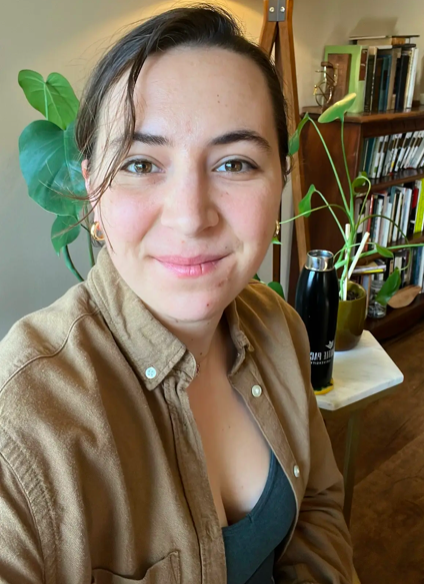Thoughts upon Reading “On Beauty and Being Just” in the Oncologist’s Office
by Alea Peister
The room is dark, its only light offered
by the ultrasound machine’s blue screen.
A technician helped me shoulder down the right
side of my pink robe, exposing one breast.
Now she spreads warm, mint-scented gel
on my skin. Kind, calm, she makes careful
gestures with her plastic wand, scans beneath
the surface — up, around, down, quick-then-slow-
then-pause, then quick again. In the gloom
a speaker murmurs stream sounds. My flesh
gives way, pushed into shapes I do not
recognize. I close my eyes. Turn my face
away. She pats my shoulder — “okay,” she
says, “we’re done, but wait here a moment —” then
leaves to check the images she made.
She turns the lights on when she leaves. Under
their fluorescent glare I raise my body
from the exam bed, clutch an over-bleached
white cloth in my left hand, stand beside
a basket, and cup the base of my right breast.
My skin cools. I do my best to be gentle,
to use soft movements. I apply scratchy
fabric, rub synthetic-scented gel away
until there’s only a thin trace. Pull the soft
pink robe back over my chest. Sit. Pick up
my book and wait. Its pages explain how
beauty brings copies of itself into being.
Beauty, I read, seems to incite,
even require, the act of replication.
It makes us draw it, take photographs —
I read how beauty precipitates an
unceasing begetting that sponsors
the idea of eternity — and how
staring is the first response of any
person to any beautiful thing. Seated
by the ultrasound machine I wonder,
does staring designate beauty?
Does replication? Who decides
when these actions signal beauty and are
a version of the wish to create?
Consider: down the hall the technician,
the oncologist, the radiologist
gather to stare at photos of my right
breast, at copies they made to search for signs
my cells might be replicating too fast.
Alone, book balanced on my knee, I stare
at pages of philosophy but want
more to stare at the women who, in pink
robes, line the halls of this office. Nervous,
quiet, composed, they wait for scans, tests, results.
Their skin is lined. They fold their hands
on their laps. In waiting rooms they asked me,
smiling, what I was reading. They asked
about my family, our history.
What they were really asking is why I,
so clearly young, just twenty-nine, am here.
My great-grandmother, I tell them, she died
of breast cancer. My grandma had it at
eighty, my maternal aunt at thirty-two.
The women nodded. Yes, they replied, yes, I
had a maternal aunt too — nurses in
pink scrubs interrupted them, called them
to back rooms. I think of these women
while I try to read how beauty prompts copies,
all these copies, of itself. My great-
-grandmother. My grandmother. My
aunt. The list repeats in my mind. I am
their copy, seated here. Just
as they called forth replication I bring
copies of myself into being. When
she returns from staring at these copies,
maybe the technician will agree
that I incite an unceasing begetting.
That I am inevitable, too. That I
sponsor the idea of eternity.
Alea's writing has been featured in Relief, Solum, Ekstasis, The Curator, Whale Road Review, and Art for the Isolated, among others. In 2025, she will graduate with an MFA in Spiritual Writing from Seattle Pacific University. Alea is passionate about the relationship between creativity and prayer, which she explores in ministry at her church. She daylights as a copywriter at a marketing firm. You can follow her writerly escapades on Instagram at @alea_peister and Substack at aleapeister.substack.com.

